從劍橋回到倫敦,接下來的兩天都在倫敦市區走走逛逛,由於幾天之後還要再回倫敦,所以除了先交代音樂饗宴之外,其他的就先行擱下,先說說離開倫敦,到Coventry和Birmingham的憶舊之旅吧!
Coventry是英格蘭West Midlands僅次於Birmingham的第二大城,也是英格蘭第10大城和聯合王國的第12大城。第二次世界大戰時,它和蘇俄的Stalingrad(現在叫 Volgograd)結為姊妹市,這也是世界上的第一對姊妹市。據說15世紀時,Coventry還一度短暫的成為英格蘭的首府呢。
有人說Coventry是在11世紀時由Mercia伯爵Leofric和他的妻子Lady Godiva建立的。但根據在Priory Gardens的考古發掘,早在西元9世紀時Coventry就已經有人類居住。
在古代,由東北流向西南的亞芳河(The River Avon)把這一帶分隔為Arden和Feldon兩個地區。在Arden森林附近的村落逐漸形成了後來的Coventry。
Coventry原來的名字叫作Cofantreo,它源自此地早期名叫Cofa的移居者,他以樹作為疆界,因此叫作「Cofa-n-treo」,因為古英語中的「-n-」類似現在的「's」,所以「Cofa-n-treo」也就是「Cofa's tree」的意思。。
關於Coventry名稱的由來還有外一則傳說,表示是源自Celtic-Roman的水神Coventina,衍生出了Coventre這個名稱。字尾的「tre」有市鎮的意思,也就是Convent Town。
不管Coventry名稱來源為何,Mercia伯爵Leofric和他的妻子Lady Godiva無疑是Coventry最最有名的傳說了。Godiva原來的名字叫Godgifu(發音Godgivu),是神的禮物(God's gift)的意思。
在Godiva嫁給Leofric之前,就是一位盎格魯薩克遜的貴族女子,擁有極多的土地。而Leofric則是英格蘭最有權力的三個人之一,在1016年,被King Cnut任命為伯爵,直到1057年過世。他的妻子Godgifu比Leofric晚10年去世,她是當時英格蘭最有權力的地主。
Godiva最有名的故事就是裸身騎馬繞行市街,藉以勸諫她的夫婿Leofric降低對Coventry貧苦人民的稅捐。據說當Godiva騎馬裸身走過時,全城百姓都把窗門緊閉,因為她們不願意讓為她們挺身而出的Godiva感到羞辱。
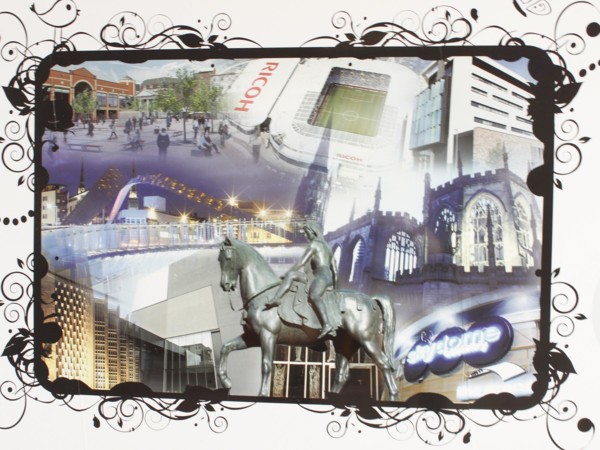
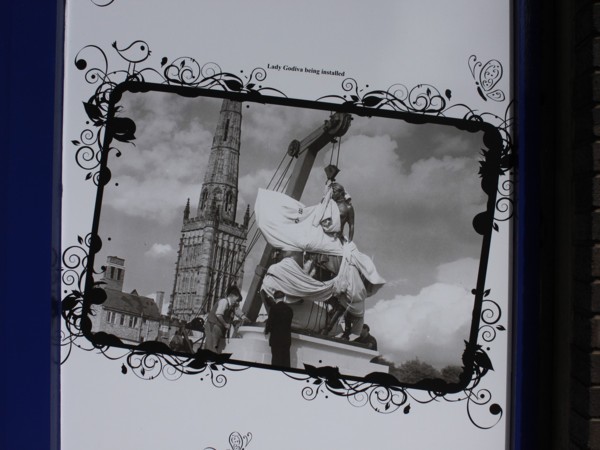
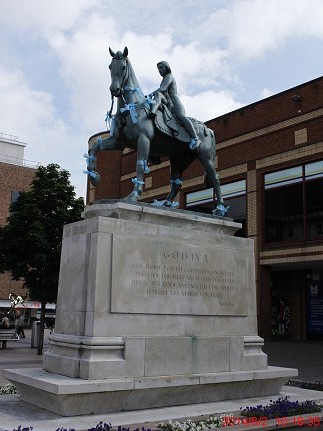
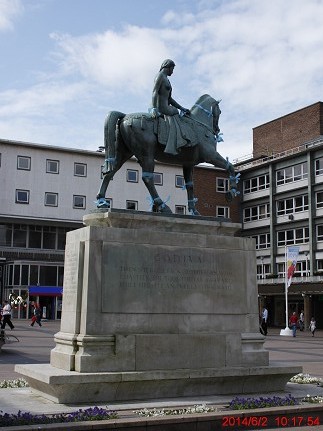
難道真的全城就沒有一個人「偷看」嗎?其實也未必。據說當Godiva騎馬裸身走在街上時,有一個叫Tom的男子就忍不住從門上的小洞偷看,結果眼睛瞎掉了。在市中心購物中心就有一尊叫作Peeping Tom的木雕。這也是為什麼後來管偷窺者叫Peeping Tom的緣由。
不過,以當時的Coventry而言只是一座小小村落,只要短短時間就能騎馬走過。再說這個傳說並不是當時就有的,而是在120年後才出現在來自St. Albans的編年史作家Roger of Wendover寫的「Flores Historiarum(意思是Flowers of History)」書中。不論故事真偽如何,Godiva確實是Coventry歷史上重要的人物之一,到現在Coventry市中心廣場上還矗立著一尊Godiva裸身騎著馬的銅像,每年Coventry還有以Godiva為名的音樂節。此外,比利時有一個巧克力品牌也以Godiva為名,並以裸身騎在馬上的Godiva作為商標。
除了Godiva之外,Coventry在近代歷史上還是一個讓英國人不能忘懷的地方呢。
西元9世紀時,薩克遜人就開始在這裡落腳,到了1043年,Mercia伯爵Leofric和他的妻子Lady Godiva在薩克遜人的遺跡上建了修道院,Coventry開始在這裡發展。1349年的黑死病讓Coventry人口少了一半,直到14世紀結束Coventry都是不受歡迎的地方。後來又因為在17世紀英國內戰期間支持議會黨人(Parliamentarians)。因此,查理二世國王(King Charles II)為了不讓Coventry提供反對者庇護,在1662年拆除了建於13、14世紀的城牆。
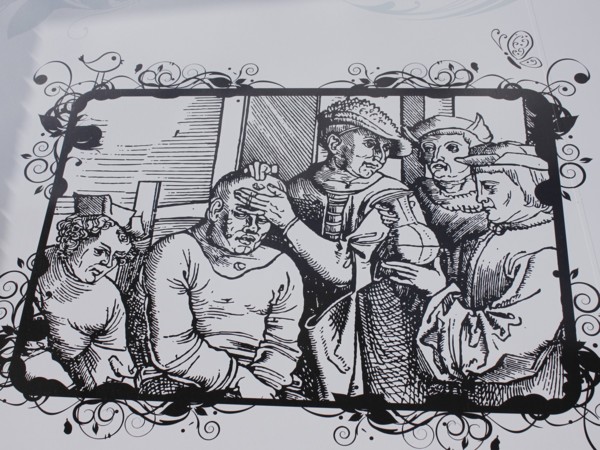
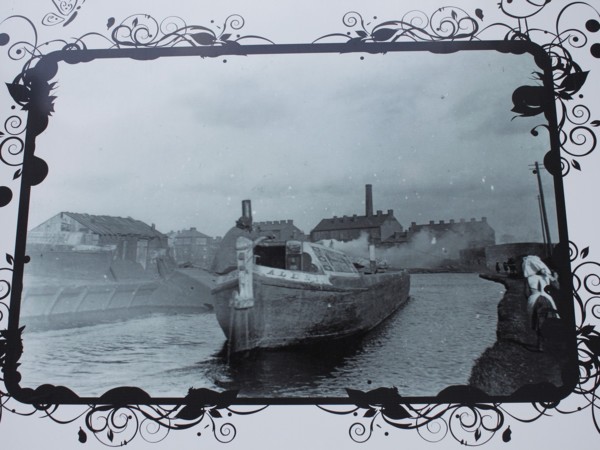
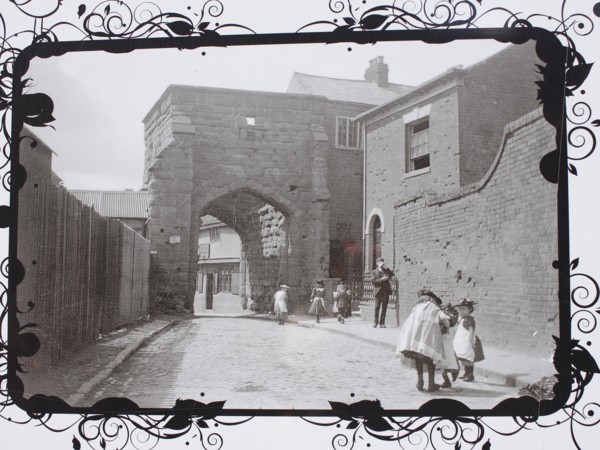
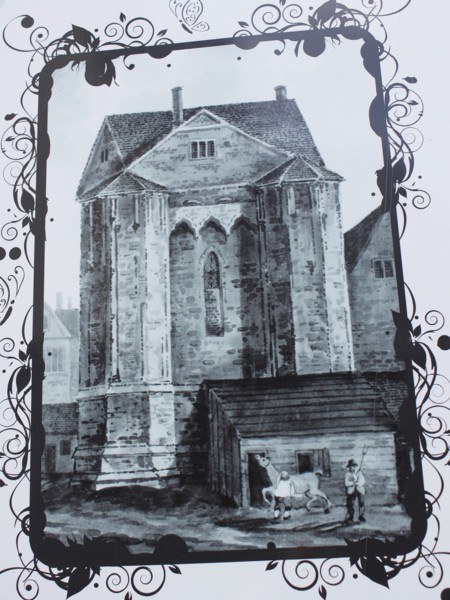
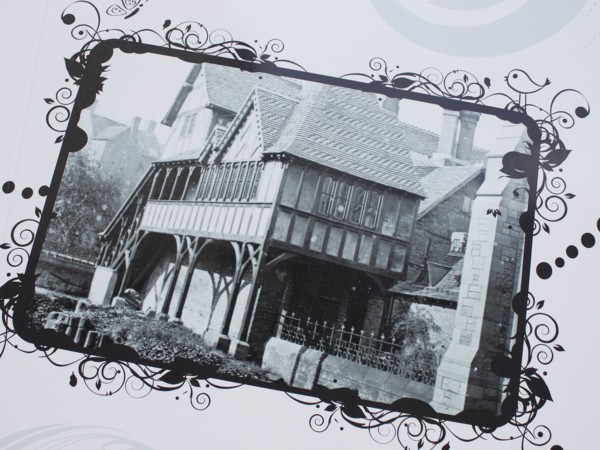
到了18世紀,受到工業革命的影響,Coventry的鐘表製造工業開始蓬勃發展。由於受到鐘表產業對於精準的嚴格要求,使得19世紀Coventry更進一步成了英國的自行車和汽車工業重鎮。1898年, Motor Mill汽車工廠誕生的第一輛戴姆勒汽車(Daimler Cars)開啟了英國汽車工業的先河。
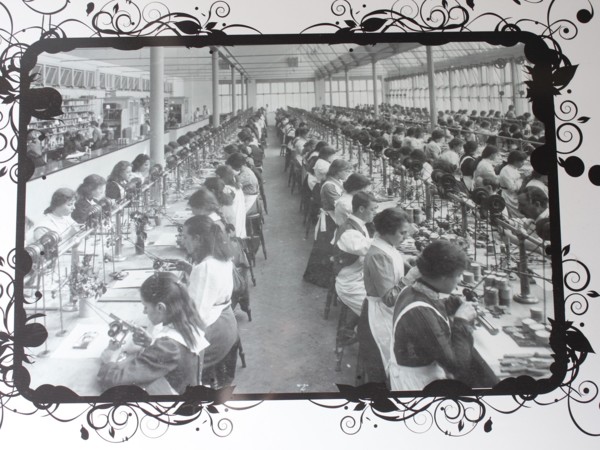
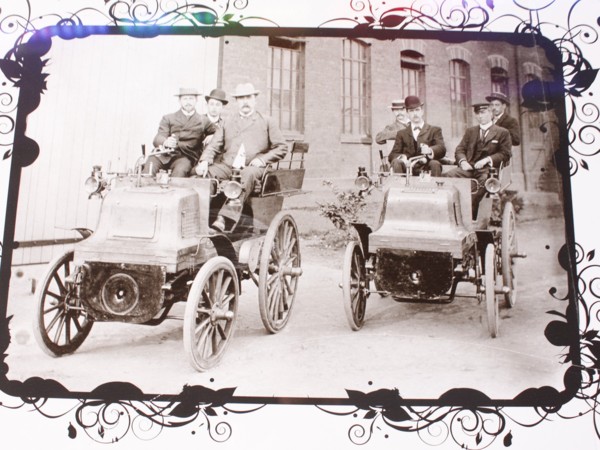
也因為Coventry是英國汽車工業重鎮,又成了後來飛機製造和國防工業重鎮。以致在第二次世界大戰時,讓Coventry遭受了幾近毀滅的摧殘。1940年11月14日,德國對Coventry發動了閃電式轟炸(Coventry Blitz),幾乎有4,000棟房舍和四分之三的工廠被徹底摧毀,整個城市成為一片廢墟。德國人管這叫作「Coventrate」意思就是「集中轟炸摧毀」。
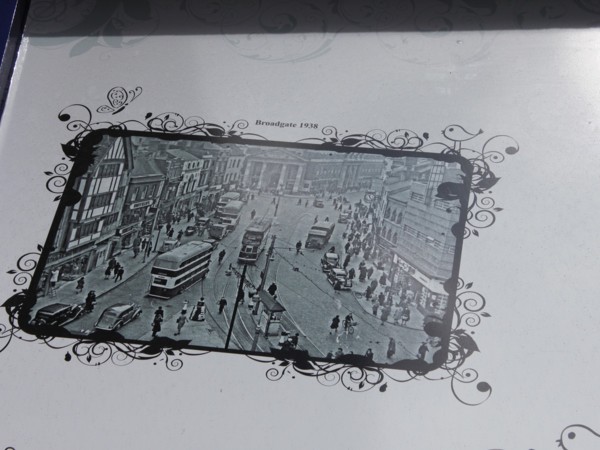
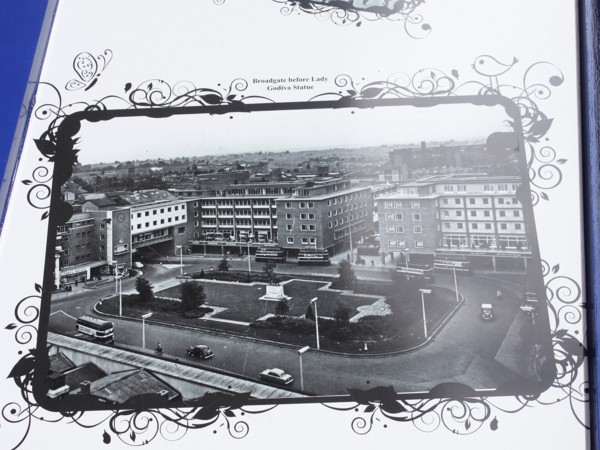
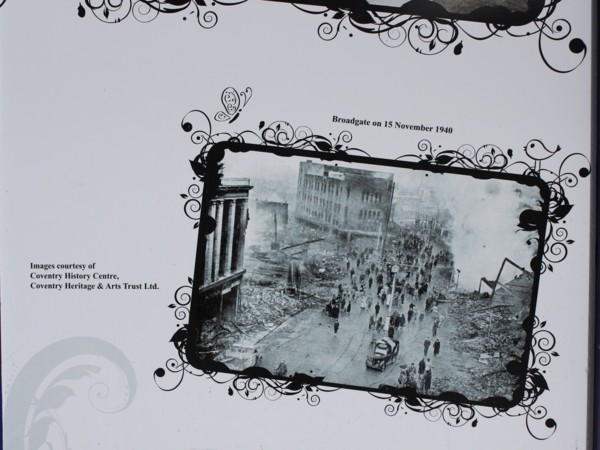
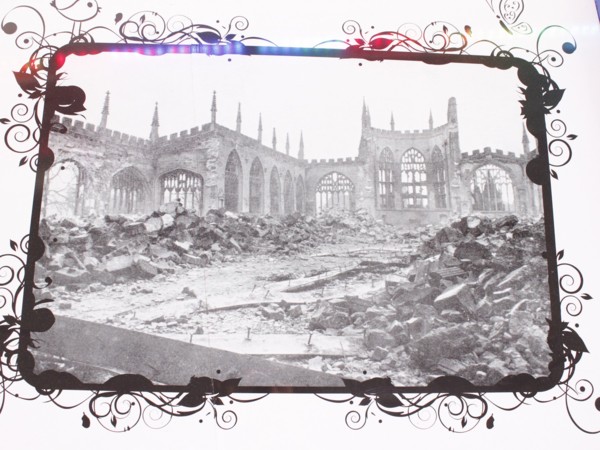
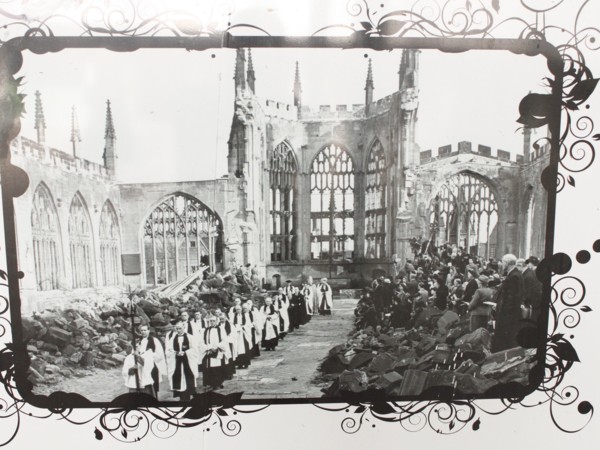
1962年英國作曲家Benjamin Britten為遭德國空軍大轟炸而摧燬Conventry大教堂重建落成譜寫了一首「戰爭安魂曲」。對英國來說,1940年科芬特里的大轟炸簡直就是第二次世界悲慘事件的象徵,以致產生了conventrize這個英文中代表「轟炸摧毀」的詞句。
除了conventrize這個詞之外,還有一個與Coventry有關的詞句叫「sent to Coventry」。
這個詞又是怎麼來的呢?
「sent to Coventry」這個古老的詞彙經常被用來表示被所有的人忽視或遺棄。但這並不是它原來的意思。早在在16世紀時,許多異教徒都被送到Coventry處決,也因此,「sent to Coventry」有了另外一種涵意。到了17世紀,英國內戰時期,Oliver Cromwell(克倫威爾)將為查理一世國王作戰的蘇格蘭保皇黨成員監禁在Coventry的St. Johns Church。因此,在當時「sent to Coventry」又有了代表被放逐的意思。
第二次世界大戰的毀滅性轟炸,毀滅了Coventry,但也讓這個城市重生。除了作曲家Benjamin Britten的「戰爭安魂曲」之外,還有許多音樂作品面世。在這裡就錄一首Neville Macaulife為紀念那次大轟炸而作的長詩「Coventry Rose」吧!
他說:
很久以前,這塊土地上的一座城市,一夜之間被另一個國家摧毀,554個大人和小孩死在成為廢墟的家裡。在這裡,長出了一株玫瑰。這就是它的故事:
A city lay gently dreaming,
As moonbeams peeped and pried,
Trying each little window,
To see the folks inside.
And oft within each window,
A slumbering figure spied:
Here a babe in cradle,
A young mother by his side,
Or there a farmer home from field,
Or worker in snorry stride.
And every little moonbeam
Was gentle with its light,
Careful not to waken,
Careful not to fright.
For every humble worker,
And every weary wife,
Is king and queen of stately dream,
When ends the working strife.
A city lay gently dreaming,
As moonbeams did peep and pry,
And then-a sound of engines,
Unbidden filled the sky.
Now swift, each dreamer from his slumber,
Did violent leave betake,
With cries of "quick!" and "get below!"
And "shake the kids awake!"
And soon ten thousand feet were rushing
Down dark and winding stairs,
Infants snatched and carried,
Old folk wheeled in chairs,
Out of the little houses,
Borne by unspoken fears.
And now the gentle moonbeams
Lit-and lit well-the way,
To deep and cavernous shelters,
Wherein to wait the day.
But even those swiftest awake
Sometimes found shelter too late!
For now, with huge and terrible sound,
Explosions echoed all around.
And the little dancing moonbeams
Now fed each bombers' eye,
That peeled and shrieked a dreadful dirge,
For those about to die.
And many a little cottage,
With all still trapped within,
Did burst and burn with brilliant flame,
As if to purge some ghastly sin.
And sometimes a blazing nursery
With toys still scattered and piled,
Did make of its fire a funeral pyre,
The last blessed Rites for a screaming child.
And as each rushed to shelter,
Down ancient, flagstoned street,
There was none did note a little rose
With no means of such retreat.
The little rose dwelt quietly
On such sudden need to fly:
"The earth doth shake most strangely,
And men do shout and cry,
But I know full well the hand of man,
When flames are in the sky!"
"But whatever draws near,
I will meet without fear,
For this land is mine
Where grows my vine!
Claim of my roots, deep and long,
Ward of my thorns, barbed and strong,
So here I stand and vow to be,
Tomorrow's day, alive and free."
For ten long and dreadful hours
The bombers came and went,
Like insects drawn to fire,
Or from some great Darkness sent.
But with dawn's first beaming ray,
They, as foul dream, faded away,
For not to be seen,
'Mid deeds so unclean,
By the holy light of day.
And then back from each shelter underground,
Crept richest and poorest of all the town,
Equals in dread of that to be found;
And the sun revealed, by first light,
Their darkest fears of all that night:
For what had stood full six centuries,
In splendour and in might,
Forged on that land by Masonic hand,
Was gone in a single night.
Of that City of Three Spires,
Scarce naught did yet remain,
And of the Church and little chapel,
That had in their shadow lain,
Of these, no trace was there,
Except for rubble piled high,
On those who'd knelt in final prayer.
From St. Mary's Hall to the ancient walls
The blaze outshone the day,
They counted lost each little house,
Each building tall and grey,
And noted missing neighbours
With deepening dismay.
They counted lost each absent child,
Each daughter, fair and sweet,
They counted lost each warden,
The soldiers of the street.
They counted lost each fallen babe,
And spade by spade,
In manner brave,
They dug another little grave.
Now swift the City Fathers met,
In Council long and grim,
The city burned and ruined,
Unto the very fringe,
The fate of Europe hanging
Upon a creaking hinge:
They gazed upon the ruins,
And then the Eldest harshly spake:
"What butcher's bargain wrought they here?
They'll not this city take,
For by our hand, we'll hold this land,
Or our fathers' names henceforth forsake!"
"And though they come again tomorrow,
And burn all that remain,
They'll find most savage welcome,
From all might of this domain."
"And by all let this be known,
To bear this grim advice:
That they who tuned this fiddle
Shall pay the fiddler's price."
"For when all the dead are counted,
And rest in grave or urn,
Then with savage hand, we'll storm their land,
And grimly reap our just return!"
And then glancing down upon the ground,
To which only ash seemed wed,
He saw a little, gentle, fallen rose,
To count among the dead.
Thought he: "Poor loss a Summer flower
When Winter's rage is here,
Small use to fire cannon,
Small use to unleash shell,
Would that all our losses
Could thus be borne so well!"
And hearing this, the little rose would speak:
"The city children oft danced around my tree,
With their prattling tales of frogs and snails,
They sounded much like thee!"
"And though they be strange clocks
That mark these dreadful hours,
I think they'd no more winding need,
Would you but hear the voice of simple flowers!":
"Will more cities burned one good remake?
Can corpse begat a child?
Hath man made this a better place
Than when all the Earth was dear and wild?"
"A rose cannot with wisdom speak,
Nor can she be a fool,
She can but hope that man this earth,
Will with wise Dominion, someday rule."
"So let Earth turn full circle
'Ere vengeance be begun,
For the light of love is setting
Beneath a blazing sun,
And he who stays the march of war
Hath the greatest battle justly won."
"So hear a dying rose beseech you,
Forego your rage and wrath,
And find other course of action,
That for rose and man be common path."
"For I'd hoped my petals, fair and sweet,
Might grace some little, quiet street,
But the city, in her final hour,
Made only call for might and power,
So 'mid her ruins let me rest,
But would you heed my last request?"
"When you build upon these ruins
A new city, fair and free,
Girded with mighty highways,
And buildings of majesty,
Might you-perhaps in some shady corner,
by chapel or oaken tree-
somewhere pause, and think to plant...
Another rose like me?"
And saying thus she was borne away,
Perhaps on some angel's hand,
No chart had marked her kingdom,
No gun had marked her stand,
And naught did mark her little grave
Upon the ruined land.


 字體:小 中 大
字體:小 中 大
























